
Voters in Taiwan recently handed a third consecutive victory to the Democratic Progressive Party (DPP), which considers Taiwan separate from China and promotes a separate national identity.
The election follows a recent Pew Research Center survey that examined how people in Taiwan feel about their own identity, as well as how they view China. Here’s a closer look at how people in Taiwan see these issues, based on the survey, which we conducted from June 2 to Sept. 17 last year.
Pew Research Center conducted this analysis to assess how people in Taiwan view their own identity, how they see China and whether they are satisfied with how things are going in Taiwan.
Data comes from a survey of 2,277 adults in Taiwan conducted as part of a broader study of attitudes in Hong Kong, Japan, South Korea, Taiwan and Vietnam. The survey was fielded from June 2 to Sept. 17, 2023. All interviews in Taiwan were conducted over the phone.
This survey is part of the Pew-Templeton Global Religious Futures project, which analyzes religious change and its impact on societies around the world.
Respondents were selected using probability-based sample designs. The data was weighted to account for different probabilities of selection among respondents and to align with demographic benchmarks for adult populations.
Here are the questions used for the analysis, along with responses, and the survey methodology.
Identity in Taiwan
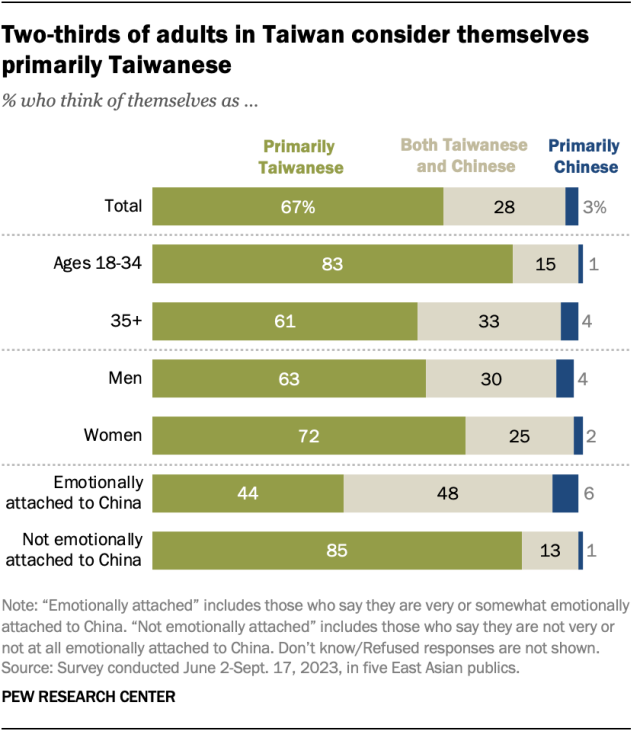
While the Chinese government views Taiwan as a breakaway province, only 3% of people in Taiwan think of themselves as primarily Chinese. Nearly three-in-ten (28%) think of themselves as both Taiwanese and Chinese, but the largest share by far (67%) see themselves as primarily Taiwanese. The share of adults in Taiwan who view themselves as at least somewhat Taiwanese has not changed significantly since the Center last asked this question in 2019.
Adults in Taiwan under the age of 35 are especially likely to identify as solely Taiwanese (83%). And women are more likely than men to do so (72% vs. 63%).
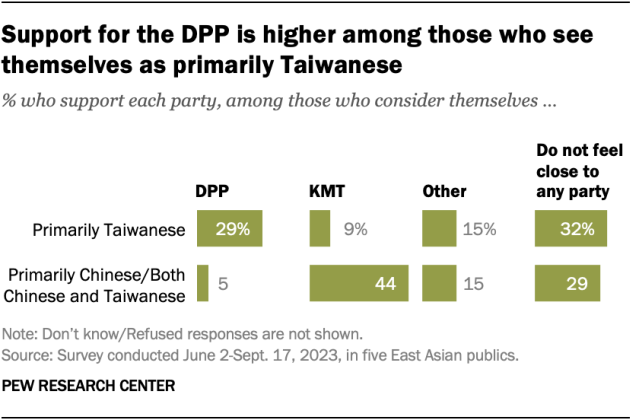
Identity in Taiwan is tied to politics. Those who consider themselves primarily Taiwanese are most likely to align themselves with the DPP.
Meanwhile, those who regard themselves as both Chinese and Taiwanese, or as primarily Chinese, are more aligned with the Kuomintang (KMT). Compared with the DPP, the KMT is more closely aligned with neighboring China.
Emotional attachment to China
Although few in Taiwan identify as primarily Chinese, 40% still have an emotional connection to the mainland. This includes 11% who say they are very emotionally attached to China.
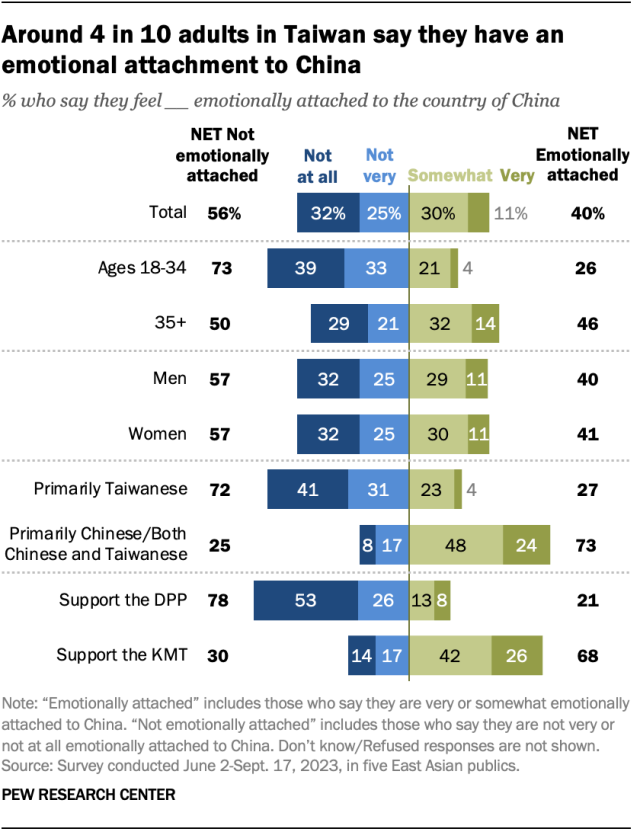
Emotional attachment to China is more common among older adults in Taiwan. While 46% of those ages 35 and older report an emotional connection with China, only 26% of those under 35 say the same. There are no differences in these views by gender.
How people in Taiwan self-identify is linked to their emotional attachment to China. About three-quarters of adults in Taiwan who see themselves as mainly Chinese or both Chinese and Taiwanese say they are emotionally attached to China. A similar share of those who consider themselves primarily Taiwanese say they are not emotionally attached to China.
There are also notable differences by party affiliation. Roughly seven-in-ten adults who support the KMT say they have an emotional attachment to China. Only around two-in-ten of those aligned with the DPP say the same.
Perceived threats to Taiwan
Most people in Taiwan consider China’s power and influence a threat. This includes 66% who label it as a major threat – more than say the same about the power and influence of the United States or Russia (45% and 25%, respectively).
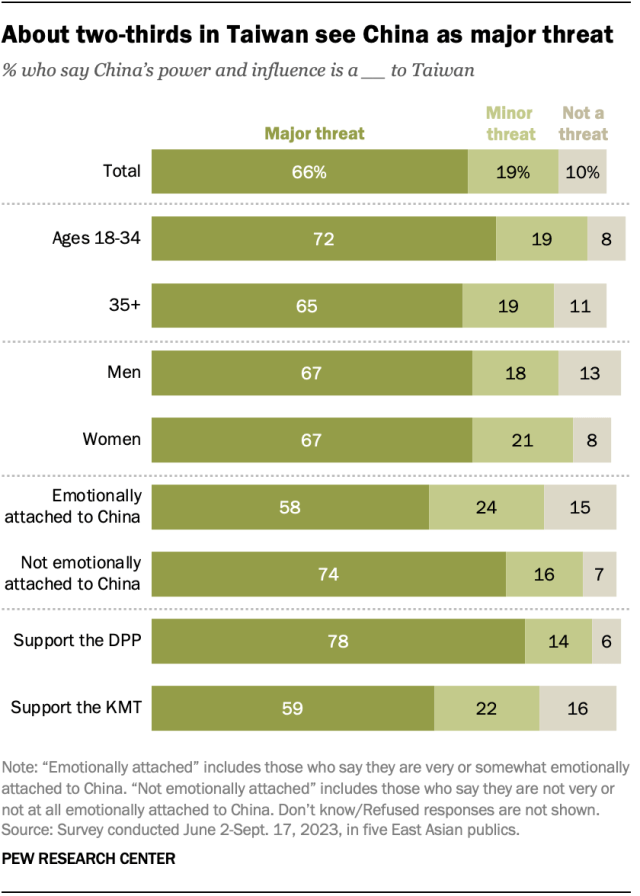
Younger adults are more concerned than older adults about China’s power and influence, as are those with more education. Still, majorities across age groups see China’s power and influence as a major threat to Taiwan.
Even adults in Taiwan who identify as primarily Chinese, or as both Chinese and Taiwanese, see China’s power and influence as a threat. About two-thirds of adults in Taiwan who identify as at least partly Chinese say this (64%). Similarly, about six-in-ten adults in Taiwan who say they are emotionally attached to China (58%) see its power and influence as a threat.
DPP and KMT supporters alike consider China’s power and influence a major threat to Taiwan. But DPP supporters are more likely than KMT supporters to say this (78% vs. 59%). Conversely, KMT supporters are more likely than DPP supporters (63% vs. 34%) to see the United States as a major threat to Taiwan. Earlier research has found DPP supporters favor the U.S. over China, while KMT supporters favor China over the U.S.
Satisfaction with the way things are going in Taiwan
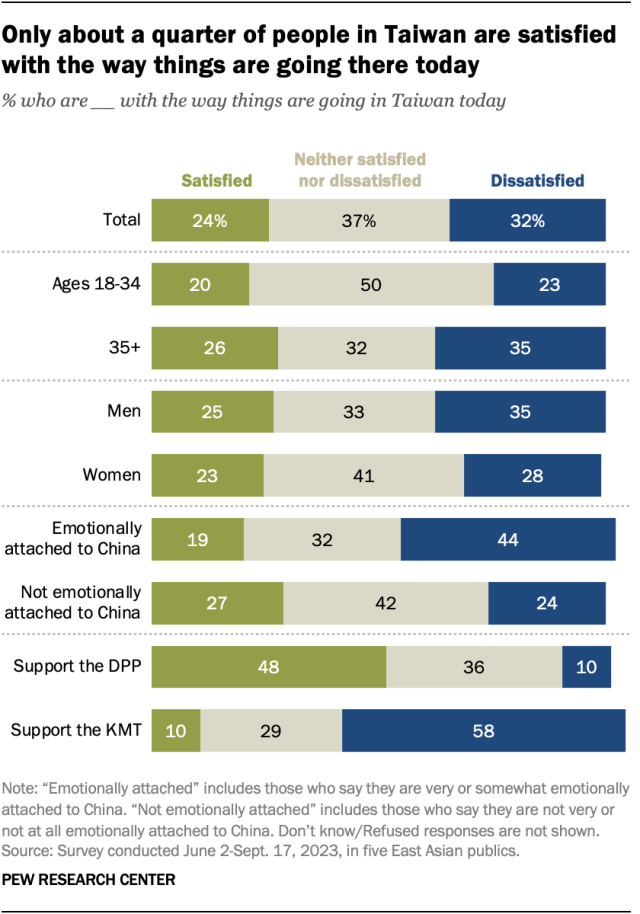
Few in Taiwan are happy with how things are going there today. Just 24% express satisfaction, while 32% are dissatisfied and 37% are neither satisfied nor dissatisfied.
Attitudes on this question are highly partisan. About half of those who support the governing DPP (48%) are content with how things are going, compared with just 10% of those who support the opposition KMT.
Those who consider themselves primarily Taiwanese are more likely to express satisfaction with how things are going in Taiwan. Similarly, those who have less of an emotional connection to mainland China also express more satisfaction with the way things are going.
Note: Here are the questions used for the analysis, along with responses, and the survey methodology.

